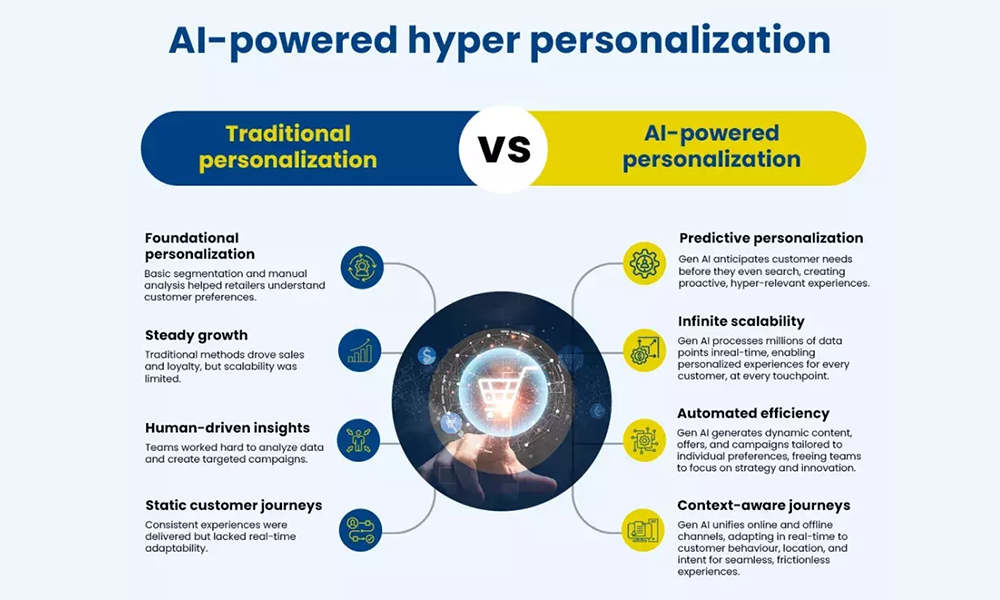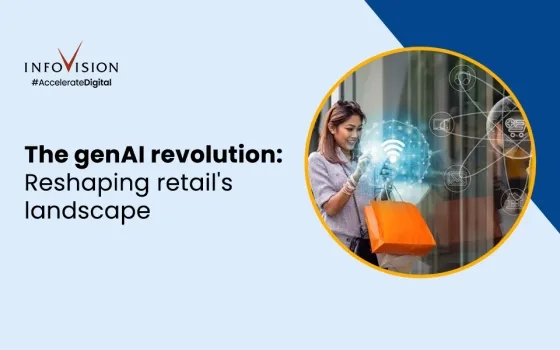Generative AI (GenAI) is rapidly transforming the retail industry, moving from a theoretical concept to a present-day reality. This isn't a vision of the distant future; it's unfolding now as retailers strategically deploy GenAI to optimize operations and enhance customer experiences. The changes span crucial areas such as hyper-personalized marketing, dynamic pricing adjustments, automated supply chain management, and even the implementation of cashier-less stores.
Expert discussions highlight that GenAI is not just on its way; it is already here, fundamentally altering retail practices.
Driving Retail's Core Objectives: Cost Reduction and Sales Growth

At its heart, retail consistently pursues two primary goals: cutting costs and boosting sales. The nature of the industry, often operating on razor-thin margins, means that anything capable of significantly impacting these areas is a genuine game-changer.
Retailers are leveraging AI to optimize their supply chains, leading to reduced waste and more accurate demand forecasting. This strategic use of AI helps maintain optimal inventory levels – ensuring shelves are stocked without warehouses being overloaded. Furthermore, AI contributes to significant cost savings over time by streamlining operations, reducing IT overhead, and automating routine processes.
On the revenue side, AI is making customer engagement more intelligent and efficient. Through AI-powered personalization, customers are presented with precisely what they're looking for, eliminating the need for extensive searching. A notable example is Walmart's application of AI for inventory forecasting, analyzing historical data, weather patterns, and regional trends to ensure product availability at the right time, thereby preventing stockouts and reducing waste during peak seasons.
AI is also revolutionizing retail marketing. GenAI can now craft highly targeted campaigns by analyzing customer data like past purchases, browsing behavior, and even social media sentiment. This shift means retailers can send the right offer to the right customer, at the right time, moving beyond generic promotions.
The Evolution to Hyper-Personalization

While personalization has been a long-standing retail focus, GenAI is propelling this forward into hyper-personalization. This creates experiences that feel uniquely tailored for each individual customer.
Consider chatbots: once basic query handlers, they now understand context, sentiment, and intent. Instead of listing numerous similar items, they interpret the customer's true desires and present the most relevant choice. Retailers utilize AI to analyze customer sentiment and behavior in real time, enabling precise understanding of preferences – from color to style, fit, and brand inclinations – making shopping frictionless and more engaging.
Illustrating this shift, Domino's allows customers to order pizza using just an emoji, relying on AI that already knows their usual order. Beauty retailer Sephora employs AI chatbots to offer personalized product recommendations and makeup tips, using data like customer preferences and skin tone to provide tailored advice akin to in-store consultants, which can boost engagement and conversion.
Crucially, hyper-personalization is key to addressing customer churn. AI is being used to predict when a customer might leave and initiate proactive retention efforts. AI-powered churn prediction models analyze habits and engagement levels to flag at-risk customers, allowing retailers to deploy personalized offers or re-engagement campaigns before customers abandon the brand.
AI's Role in Mitigating Product Returns

Product returns are a significant cost burden for retailers. AI is now addressing this challenge from both proactive and reactive perspectives.
Proactively, AI enhances product recommendations and sizing tools, reducing the likelihood of incorrect purchases. Virtual try-ons and AI-generated fit assistants help customers make more informed decisions, leading to fewer returns.
Reactively, AI analyzes return patterns to identify products frequently returned and the reasons behind it. This intelligence informs decisions on improving product descriptions, fixing manufacturing defects, or even discontinuing problematic items.
For instance, European fashion retailer Zalando uses an AI-powered size advice feature that analyzes data to inform customers if items run small or large, recommending size adjustments. This has resulted in a 10% reduction in size-related returns for advised items. Amazon also employs AI to identify damaged items before shipment, reducing inevitable returns later on.
Unifying Online and Offline Experiences

The historical gap between online and in-store shopping experiences has been a major pain point. AI is now instrumental in bridging this divide, enabling a seamless transition for customers.
Imagine a customer browsing online in the morning and visiting a physical store later; AI can recognize their online activity and offer personalized recommendations based on what they viewed. Some retailers are implementing AI-powered cart handovers, syncing mobile shopping carts with real-time in-store inventory and suggesting alternatives or delivery options instantly if a product is unavailable.
Luxury brand Burberry exemplifies this with "phygital" store experiences using smart mirrors and digital screens to integrate online and offline seamlessly. This AI-driven unified commerce is becoming the new standard.
AI as an Active Business Partner
Retailers are increasingly adopting Agentic AI, where AI moves beyond simple assistance to actively taking action.
Many companies now deploy AI-powered dynamic pricing models that adjust product prices in real-time based on demand, competitor pricing, and customer behavior, making instant decisions without manual review.
AI is also automating back-end operations like supply chain management, predicting potential stockouts and rerouting shipments in real-time to optimize inventory levels without human intervention. Ocado, a UK online grocer, uses AI-powered fulfillment centers where intelligent robots autonomously manage inventory, retrieve products, and pack orders.
Cashier-less checkouts, powered by AI, are appearing in stores. AI not only scans but monitors behavior, detects fraud, and personalizes offers in real time. Even finance departments see AI's impact, with AI-driven credit collection agents managing invoices, payment reminders, and credit limits autonomously.
Essentially, AI is evolving from just a tool to a teammate making decisions alongside human staff.
Navigating Challenges and Considerations
Despite the significant promise of GenAI, the implementation journey presents obstacles.
Cutting through the AI hype is crucial. With pressure on executives to adopt AI, there's a dilemma: many want to launch AI projects simply because others are doing so, but not every problem requires GenAI.
Before investing, retailers must ask critical questions:
- Is our data ready? AI's effectiveness depends on clean, organized, and structured data; messy data yields unreliable results.
- Does this solve a real business challenge? Just because AI can do something doesn't mean it should.
- What is the actual ROI? AI projects can be costly, and not all deliver expected results.
The key takeaway is that AI is powerful, but only when used thoughtfully and with appropriate data. Retailers who prioritize cleaning, centralizing, and structuring their data will gain a significant competitive edge as AI develops. Amazon demonstrates this by using AI to clean and structure vast customer data to power its recommendation engine.
Security and ethical concerns represent the "elephant in the room". While AI-driven fraud detection systems, like those at Target analyzing transaction data for anomalies, are being implemented, the increasing power of AI also magnifies security risks. Deepfake scams, misinformation, and data privacy are raising alarms. AI systems require vast amounts of customer data, prompting serious questions about data usage and limits.
Experts emphasize that businesses are not dedicating sufficient attention to security. As companies rush to adopt AI, cybersecurity risks are often treated as an afterthought, which is problematic. Given the rapid pace of AI evolution, ethical and security discussions must accelerate to keep pace. Addressing this requires continuous vigilance, innovative strategies, and a commitment to cybersecurity excellence.
The Path Forward for AI in Retail
The future of AI in retail isn't about whether companies will adopt it, but how they choose to utilize it. AI is expected to become embedded in every business function, including HR, supply chain, marketing, and finance. The challenge will shift from finding AI solutions to figuring out how to use them effectively.
Guidance suggests that businesses should start small, initially focusing on internal use cases and prioritizing projects with clear ROI. Adaptability is paramount because AI is evolving so quickly that the next three months may matter more than the next three years.
Retail is at an inflection point. Success will favor brands that approach AI strategically, rather than merely following the trend. The landscape indicates that hyper-personalization is now an expectation, not an option. Agentic AI is transforming the technology from a passive tool into an active business partner. And crucially, security and ethical concerns must be confronted directly.
The ultimate question is not whether AI will transform retail, but how effectively businesses can leverage it to their advantage, as AI is not coming – it is already here.



















